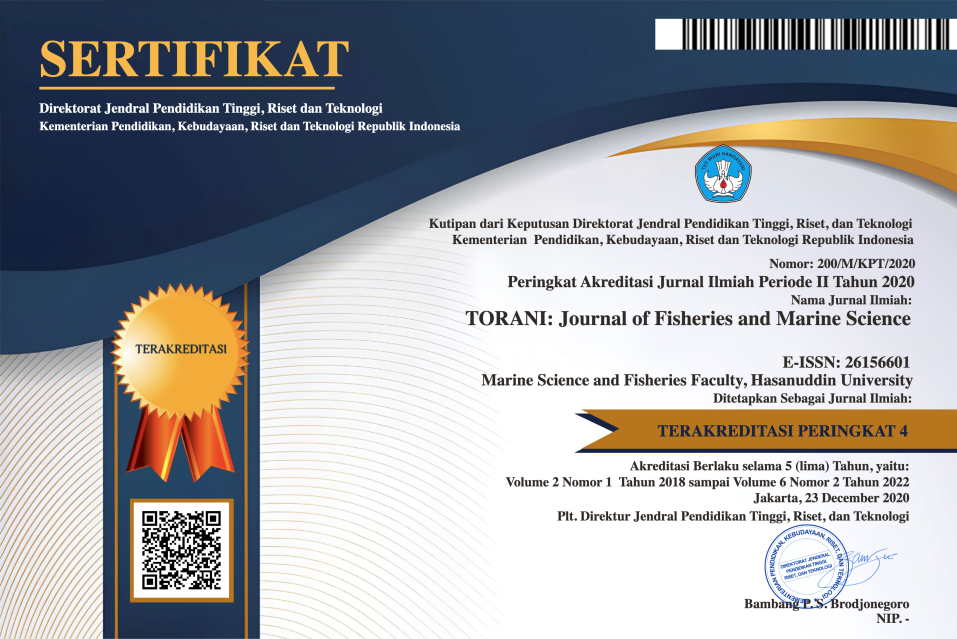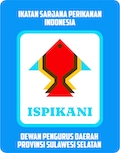Pengaruh Perbedaan Varietas Rumput Laut (Kappaphycus sp) dan Variasi Kedalaman Terhadap Pertumbuhan dan Produksi Rumput Laut Menggunakan Metode Budidaya “Top Down”
DOI:
https://doi.org/10.35911/torani.v24i1.114Abstract
The objective of this study was to investigate the effect of different types of Seaweed (Kappaphycus sp) and depth variation on the growth, production and carrageenan content of Seaweed using a top down cultivation method. Top down method combined the two methods of cultivation, the method of surface and off-bottom method. The types of Seaweed used were Kappaphycus alvarezii (Brown Maumere and Local Maumere) and Bali Seaweed (Kappaphycus striatum). This study was designed using a factorial experimental design, where is comprised of two factors: the types and water depth. Parameters measured were daily growth rate, production and carrageenan content of Seaweeds. The results showed that different types of Seaweed gave a significant effect (P<0.05) on daily growth rate and production of Seaweeds, however depth variation did not give a significant effect on daily growth rate and production of Seaweeds (P>0.05). A combination of Seaweed types and depth variation did not give a significant effect on daily growth rate and production of Seaweeds (P>0.05). The highest carrageenan content was found in Local Seaweed (42.15%). Brown Seaweed produced 40.59% of carrageenan content while Bali Seaweed produced 35.80%.Downloads
References
Afrianto, E dan Liviawaty. 1995. Beberapa Metode Budidaya Ikan. Penerbit Kanasius. Yogyakarta. Ahda, A., S. A. Agus., B .S. Imam., B. Ilham., Iskandar., S. Made., Y. Restu., setiawan., N. Kurnia.,
Edward., Z. Achmad., Jamal., E. Irzal, dan N. Nico. 2005. Profil Rumput Laut.
Direktorat Jenderal Perikanan Budidaya. Departemen Kelautan dan Perikanan. Jakarta. Vol. 2 (1) : 167. hal.
Andarias, I. 1992. Pengaruh Takaran Urea dan TSP terhadap Produksi Bobot Kering Klekap.
Bulletin Ilmu Perikanan dan Peternakan. Universitas Hasanuddin. Makassar.
Anonim, 2006. Pengolahan Rumput Laut Eucheuma sp. (http://www.dkp.go.id/content.php?o-777)
Anonim, 2009. Map Of Local Economy Potency Kabupaten Pinrang. (http://www.cps-sss.org/
web/home)
Geider, W. 2006. Fotosintesis Pada Alga dan Bakteri. Wikipedia Indonesia. (www.google.com) Mayunar, 1989. Pengaruh Pemberian Kalium Nitrat Terhadap Pertumbuhan Rumput Laut
Gracillaria verucosa. Fakultas Peternakan dan Perikanan. Universitas Hasanuddin. Makassar.
Patanjai, R. S. 2007. Pertumbuhan, Produksi dan Kualitas Rumput Laut Kappaphycus alvarezii (Doty) pada Berbagai Habitat Budiodaya yang Berbeda. Program Pasca Sarjana. Universitas Hasanuddin. Ujung Pandang.
Parenrengi, A., E. Suryati, dan Rachmansyah, 2007.Penyedian benih dalam menunjang kebun bibit dan budidaya rumput laut, Kappaphycus sp. Makalah disampaikan pada Simposium Nasional Riset Kelautan dan Perikanan, Jakarta.
Saenong, 2002. Prioritas Pengembagan Budidaya Rumput Laut di Sulawesi. (http://www.fao.org/
docrep/field)
Sedana, I. G., Jack S.D.. Soehardi P. dan Nugroho A. 1985. Uji Coba Budidaya Rumput Laut di Plot
Farm. (http://www. fao.org/docrep/field.htm)
Sulistidjo, 1994. The Harvesr Quality of alvarezii Culture by Floating Method in Pari Island Nort Jakarta. Jakarta: Researchand Development Center for Oceanology. Indonesia Institute of Science.
Sulistijo, 2002. Budidaya Rumput Laut. (www. google.com)
Zulkifli, 2005. Perbandingan Pertumbuhan, Produksi dan Kandungan Karagenan Rumput Laut Kappaphycus alvarezii yang Dibudidayakan di Dalam dan Di Luar Padang Lamun. Tesis. Jurusan Perikanan. Fakultas Ilmu Kelautan dan Perikanan. Universitas Hasanuddin. Makassar.


















